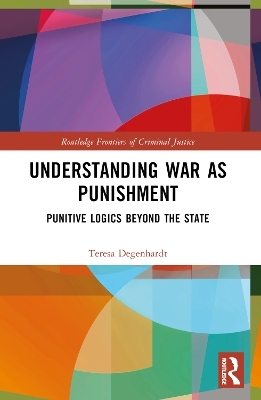
War as Protection and Punishment
Routledge (Verlag)
978-1-032-56319-0 (ISBN)
- Lieferbar (Termin unbekannt)
- Versandkostenfrei innerhalb Deutschlands
- Auch auf Rechnung
- Verfügbarkeit in der Filiale vor Ort prüfen
- Artikel merken
This book provides an analysis of how penal discourses are used to legitimate post-Cold War military interventions through three main case studies: Kosovo, Iraq and Libya. These cases reveal the operation of diverse modalities of punishment in extending the ambit of international liberal governance.
The argument starts from an analysis of these discourses to trace the historical arc in which military interventions have increasingly been launched through reference to both the human rights discourse and humanitarian sentiments, and a desire to punish the perpetrators. The book continues with the analysis of practices involved in the post-intervention phase, looking at the ways in which states have been established as modes of governance (Kosovo), how punitive atmospheres have animated soldiers’ violence in the conduct of war (Iraq), and finally how interventions can expand moral control and a system of devolved surveillance in conjunction with both border control and the engagement of the International Criminal Court (Libya). In all these case, tensions and ambiguities emerge. These practices underscore how punitive intents were also present in the expansion of liberal governance, demonstrating how the rhetoric of punishment was useful in legitimating Western state powers and recomposing the borders of the liberal world at the periphery.
War as Protection and Punishment ends with a number of critical comments on the diffusion of punitive discourse in the international arena, considering how issues of crime and justice have also animated, at least in part, the current engagement with the Russian invasion of Ukraine. An accessible and compelling read, this book will appeal to students and scholars of criminology, sociology, politics and those interested in how penal discourses are used to legitimize military conventions.
Teresa Degenhardt is a criminologist who teaches at Queen’s University Belfast. She works at the intersection between criminology and international relations, focusing on issues related to processes of criminalization within the international sphere. She has been a visiting scholar at the University of California, Berkeley, the Hamburg Institute for Social Research and the University of Turin.
Acknowledgments
List of abbreviations
1 - Introduction
PART I: Discourses
2 - Justifying liberal military interventions at the ‘end of history’: from humanitarian compulsion to collective responsibility
PART II: Practices
3 - The case of Kosovo: from humanitarian compulsion to state-building
4 - The case of Iraq: punitive emotions and the branding of the enemy’s flesh
5 - The case of Libya: from the collective responsibility to protect to devolved surveillance
6 - Conclusion
Index
| Erscheinungsdatum | 06.09.2023 |
|---|---|
| Reihe/Serie | Routledge Frontiers of Criminal Justice |
| Verlagsort | London |
| Sprache | englisch |
| Maße | 156 x 234 mm |
| Themenwelt | Recht / Steuern ► EU / Internationales Recht |
| Recht / Steuern ► Strafrecht ► Kriminologie | |
| Sozialwissenschaften ► Politik / Verwaltung ► Europäische / Internationale Politik | |
| Technik | |
| ISBN-10 | 1-032-56319-2 / 1032563192 |
| ISBN-13 | 978-1-032-56319-0 / 9781032563190 |
| Zustand | Neuware |
| Informationen gemäß Produktsicherheitsverordnung (GPSR) | |
| Haben Sie eine Frage zum Produkt? |
aus dem Bereich


